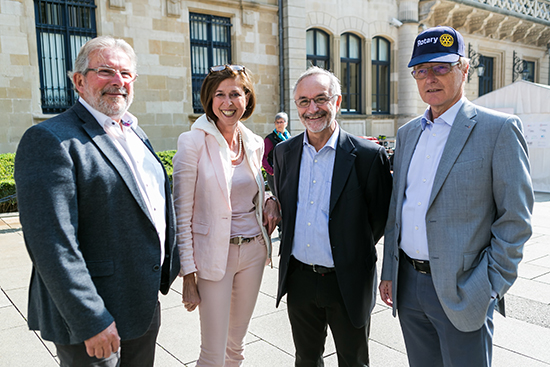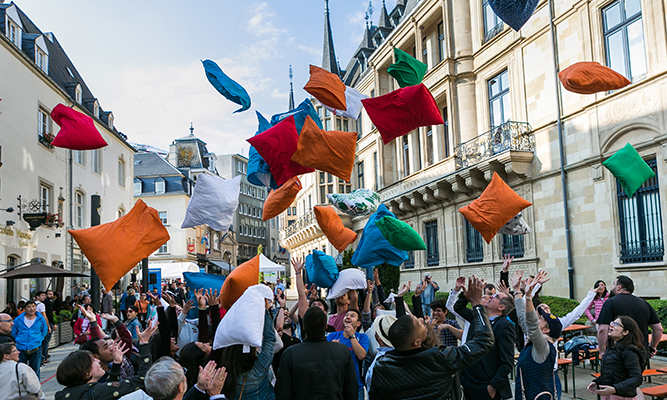On 2 September, a Giant Public Pillow Fight took place in Luxembourg in front of the Grand Ducal Palace.
The event’s aim was to raise awareness about Parkinson’s disease and the research activities of the National Centre of Excellence in Research on Parkinson’s Disease (NCER-PD).
The event was co-organised by the Rotary Clubs Luxembourg, NCER-PD and the Luxembourg Centre for Systems Biomedicine (LCSB) of the University of Luxembourg. The 14 Rotary Clubs of the Grand Duchy of Luxembourg have supported research in this field for many years, and were actively involved in organising the campaign. To mark the 100th anniversary of the Rotary Foundation, the Rotarians sold pieces of a 100 metre “Baamkuch” layer cake. The proceeds from the campaign are going to the National Centre of Excellence in Research on Parkinson’s Disease (NCER-PD). “We have been supporting biomedical research in Luxembourg for many years already,” says Constant Infalt, Country Chair and Luxembourg representative of the District Governor. “With the Pillow Fight and the sale of our impressive 100-metre Baamkuch, we want to generate an especially effective public incentive”.
Those who have always felt the urge to really send those feathers flying were in their element at this grand Pillow Fight. Everyone, of all ages could join the fights throughout the afternoon and enjoy, with several participants even dressed as mascots. While this was all in fun, it was equally a symbol of the fight that many in Luxembourg are waging every day against Parkinson’s disease: the afflicted, their families, doctors and nurses, researchers and many more.
The event started with opening speeches given by Romain Becker (President of Rotary Interclub Luxembourg), Lydia Mutsch (Luxembourg Ministry of Health), Simone Beissel (Advisor to the mayor of the City of Luxembourg), Prof Rudi Balling (Director of the Luxembourg Centre for Systems Biomedicine) and Mars Di Bartolomeo (President of the Chamber of Deputees). Together with other VIPs present, they officially opened the pillow fights with an inaugural pillow fight.

From left to right: Mars di Bartolomeo, Lydia Mutsch, Rudi Balling, Romain Becker
Throughout the afternoon, hundreds of visitors could not only join the pillow fights and buy a piece of Baamkuch, but also visit the stands of the Integrated Biobank of Luxembourg (IBBL), Centre Hospitalier Emile Mayrisch (CHEM), Luxembourg Institute of Health (LIH) and the Scienteens Lab, and learn more about research on Parkinson’s disease in Luxembourg. They could also try on a Parkinson suit ,which simulates the two most representative motor symptoms of Parkinson’s disease: the muscle rigidity and the tremors. Because the disease affects other parts of the body as well, the researchers also showed the test used in the study for other symptoms. The visitors could test their dexterity, their sense of smell and their color vision, thus understanding how the brain controls the senses and the movements and why they are affected by Parkinson’s disease.
“We are proud to be organising this event in Luxembourg together with the Rotary Club and LCSB and sincerely would like to thank all our partners without whom this event would not have been possible,” says Prof. Dr. Rejko Krüger, head of NCER-PD and a neurologist at the Centre Hospitalier de Luxembourg (CHL). “From the proceeds, we will be funding a project to research the genetic causes of Parkinson’s.”
As a physician and researcher, Krüger knows the situation of Parkinson’s patients well. “Treatment of this disease has improved considerably in recent years, but there is still a lot to do,” Krüger says. One of the biggest problems so far is that there are hardly any patient-specific therapies. The disease can be triggered by any number of different genetic or external factors. “So, one person’s Parkinson’s differs from another’s,” Krüger continues. “Only once we have understood the diversity of causes, we will be able to work on developing therapies that take into account the patient’s personal situation. The project that will be funded by the proceeds from this event is another important component in this.”
--
About NCER-PD: NCER-PD is a joint initiative of four partners in Luxembourg – Luxembourg Centre for Systems Biomedicine, Centre Hospitalier de Luxembourg, Integrated Biobank of Luxembourg, and Luxembourg Institute of Health – who are uniting their efforts and expertise to develop new methods for the early diagnosis and treatment of Parkinson’s disease. The Luxembourg Parkinson’s study NCER-PD has been funded since early 2015 by the Luxembourg National Research Fund (FNR).
About LCSB: The LCSB is a biomedical research centre of the University of Luxembourg. It is accelerating biomedical research by closing the link between systems biology and medical research. Collaboration between biologists, medical doctors, computer scientists, physicists, engineers and mathematicians is offering new insights into complex systems like biological cells, organs, and organisms. These insights are essential for understanding principal mechanisms of disease pathogenesis and for developing new tools in diagnostics and therapy. LCSB focuses on neurodegenerative diseases like Parkinson’s disease and the description of diseases as complex networks. More information at:
About Rotary: Rotary is a global “Service Club” network of 1.2 million members: dedicated men and women from all areas of society. Founded by Paul P. Harris in America in 1905, the Rotary Club is the only service club to have a foundation that puts more than 90% of its outstanding donations directly into local and international projects, and whose influential members and partners work together to promote peace, fight disease, provide clean water and hygiene, save mothers and children, support education, and grow local economies. For more than 30 years, Rotary has dedicated itself to the fight against polio, with the goal of ridding the world of this terrible disease once and for all. In Luxembourg, Rotary is known for its tireless efforts towards causes such as “Espoir en tête”, “Zesummen ennerwee”, “Team Rotary Challenge Marathon”, “Plantation d’un arbre”, and other projects that demand the cohesion between their members and have earned due recognition in society.
--
For more photos, check out the Media Gallery





